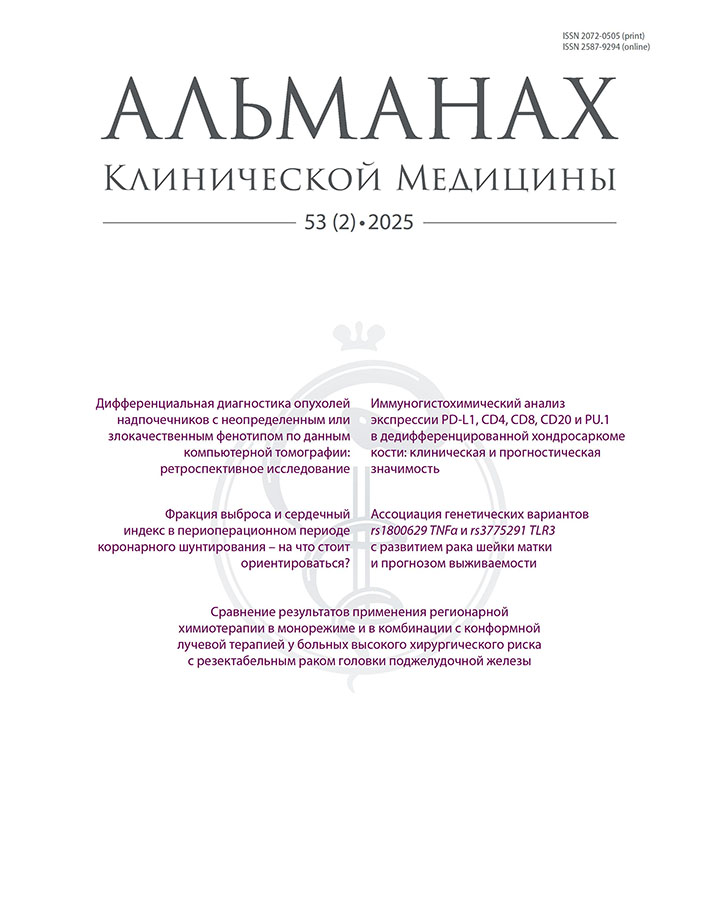АССОЦИАЦИЯ ПОЛИМОРФНОГО МАРКЕРА VAL762ALA ГЕНА ADPRT1 С ХРОНИЧЕСКИМ ГЛОМЕРУЛОНЕФРИТОМ
- Авторы: Камышова Е.С.1, Швецов М.Ю.1, Шестаков А.Е.2, Кутырина И.М.1, Носиков В.В.3
-
Учреждения:
- ГБОУ ВПО Первый Московский государственный медицинский университет им. И.М. Сеченова
- Клинико-диагностическая лаборатория «ФимедЛаб»
- ГНЦ РФ «ГосНИИгенетика»
- Выпуск: № 30 (2014)
- Страницы: 32-36
- Раздел: АКТУАЛЬНЫЕ ВОПРОСЫ НЕФРОЛОГИИ
- URL: https://almclinmed.ru/jour/article/view/286
- DOI: https://doi.org/10.18786/2072-0505-2014-30-32-36
- ID: 286
Цитировать
Полный текст
Аннотация
Об авторах
Е. С. Камышова
ГБОУ ВПО Первый Московский государственный медицинский университет им. И.М. Сеченова
Автор, ответственный за переписку.
Email: fake@neicon.ru
Россия
М. Ю. Швецов
ГБОУ ВПО Первый Московский государственный медицинский университет им. И.М. Сеченова
Email: fake@neicon.ru
Россия
А. Е. Шестаков
Клинико-диагностическая лаборатория «ФимедЛаб»
Email: fake@neicon.ru
Россия
И. М. Кутырина
ГБОУ ВПО Первый Московский государственный медицинский университет им. И.М. Сеченова
Email: fake@neicon.ru
Россия
В. В. Носиков
ГНЦ РФ «ГосНИИгенетика»
Email: fake@neicon.ru
Россия
Список литературы
- Боброва Л.А., Козловская Н.Л., Шкарупо В.В. и др. Влияние генетической формы тромбофилии на клинико-морфологические проявления и характер течения хронического гломерулонефрита//Нефрол. диал. 2010. №1. С.25-33.
- Новожилова А.П., Плужников H.H., Новиков B.C. Механизмы клеточной гибели//Программированная клеточная смерть/под ред. B.C. Новикова. СПб.: Наука, 1996. С.9-29.
- Суханова М. В., Лаврик О. И., Ходырева С.Н. Поли(АDР-рибозо)полимераза 1 -регулятор белково-нуклеиновых взаимодействий в процессах, возникающих при генотоксическом воздействии//Молекул. биол. 2004. Т.38. С.5834-5847.
- Cesarone C.F., Scarabelli L., Scovassi I. et al. Changes in activity and mRNA levels of poly(ADP-ribose) polymerase during rat liver regeneration//Biochim. Biophys. Acta. 1990. V.1087. P.241-246.
- Dantzer F., Schreiber V., Niedergant C. et al. Involvement of poly(ADP-ribose)polymerase in base excision repair//Biochimie. 1999. V.81. P.69-75.
- Figueroa J.D., Maiats N., Real F.X. et al. Genetic variation in the base excision repair pathway and bladder cancer risk//Hum. Genet. 2007. V.121. P.233-242.
- Grande J.P. Mechanisms of progression of renal damage in lupus nephritis: pathogenesis of renal scarring//Lupus. 1998. No.7. P.604-610.
- Gwinner W., Grone H.J. Role of reactive oxygen species in glomerulonephritis//Nephrol. Dial. Transplant. 2000. V.15. P.1127-1132.
- Hao B., Wang H., Zhou K. et al. Identification of genetic variants in base excision repair pathway and their associations with risk of esophageal squamous cell carcinoma//Cancer Res. 2004. V.64. P.4378-4384.
- Hunley T.E., Julian B.A., Phillips J.A. et al. Angiotensin converting enzyme gene polymorphism: potential silencer motif and impact on progression in IgA nephropathy//Kidney Int. 1996. V.49. P.571-577.
- Li F., Szaby C., Pacher P., Southan G.J. et al. Evaluation of orally active poly(ADP ribose) polymerase inhibitor in streptocin-diabetic rat model of early peripheral neuropathy//Diabetologia. 2004. V.47. P.710-717.
- Lockett K.L., Hall M.C. Xu J. et al. The ADPRT V762A genetic variant contributes to prostate cancer susceptibility and deficient enzyme function//Cancer Res. 2004. V.64. P.6344-6348.
- Lovati E., Richard A., Frey B. et al. Genetic polymorphisms of the renin-angiotensin-aldosterone system in end-stage renal disease 11 Kidney Int. 2001. V.60. P.46-54.
- Meisterernst M., Stelzer G., Roeder R.G. Poly(ADP-ribose)polymerase enhances activator-dependent transcription in vitro//Proc. Natl. Acad. Sei. 1997. V.94. P.2261-2265.
- Minchenko A.G., Stevens M.J., White L. et al. Diabetes-induced overexpression of endothelin-1 and endothelin receptors in the rat renal cortex is mediated via poly(ADP ribose) polymerase activation//FASE В J. 2003. V.17. P.1514-1516.
- Pacher P., Liaudet L., Bai P. et al. Activation of poly (ADP ribose) polymerase contributes to the development of doxorubicin-induced heart failure//J. Pharmacol. Exp. Ther. 2002. V.300. P.862-867.
- Prasad P., Tiwari A.K., Kumar K.M. et al. Association analysis of ADPRT1, AKR1B1, RAGE, GFPT2 and PAI-1 gene polymorphisms with chronic renal insufficiency among Asian Indians with type-2 diabetes//BMC Med. Genet. 2010. V.U. P.52.
- Song J., Narita I., Goto S. et al. Gender specific association of aldosterone synthase gene polymorphism with renal survival in patients with IgA nephropathy//J. Med. Genet. 2003. V.40. P.372-376.
- Szaby E., Kern T.S., Virag L. et al. Evidence for poly(ADP ribose) polymerase activation in the diabetic retina//FASEB J. 2001. V.15. P.A942.
- Szaby G., Bahrle S., Stumpf N. et al. Poly(ADP ribose) polymerase inhibition reduces reperfusion injury after heart transplantation//Circ. Res. 2002. V.90. P.100-106.
- Wang Y., Kikuchi S., Suzuki H. et al. Endothelial nitric oxide synthase gene polymorphism in intron 4 affects on the progression of renal failure in non-diabetic renal disease//Nephrol. Dial. Transplant. 1999. V.14. P.2898-2902.
- Zhang Q., Li Y., Li X. et al. PARP-1 Val762Ala polymorphism, CagA+ H. pylori infection and risk for gastric cancer in Han Chinese population//Мої. Biol. Rep. 2009. V.36. P.1461-1467.
- Zhang X., Miao X., Liang G. et al. Polymorphisms in DNA base excision repair genes ADPRT and XRCC1 and risk of lung cancer//Cancer Res. 2005. V.65. P.722-726.
- Zingarelli B., Salzman A.L., Szaby C. Genetic disruption of poly(ADP ribose)synthetase inhibits the expression of P-selectine and intercellular adhesion molecule-1 in myocardial ischemia-reperfusion injury//Circ. Res. 1998. V.83. P.85-94.
Дополнительные файлы








